Understanding the Role of Grief Counselors in Hospice
July 25, 2025
Compassionate Support Through Loss: The Critical Role of Hospice Grief Counselors

Understanding the Heart of Hospice Bereavement Support
Hospice care extends beyond managing physical symptoms; it encompasses emotional, spiritual, and psychological support for patients and their families. Among its vital services are grief counseling and bereavement support, which play a crucial role in helping individuals process loss, find meaning, and adapt to life after death. This article explores the multifaceted role of hospice grief counselors, their interventions, and the importance of integrating these services within comprehensive hospice and palliative care frameworks.
The Purpose and Goals of Grief Counseling in Hospice Care
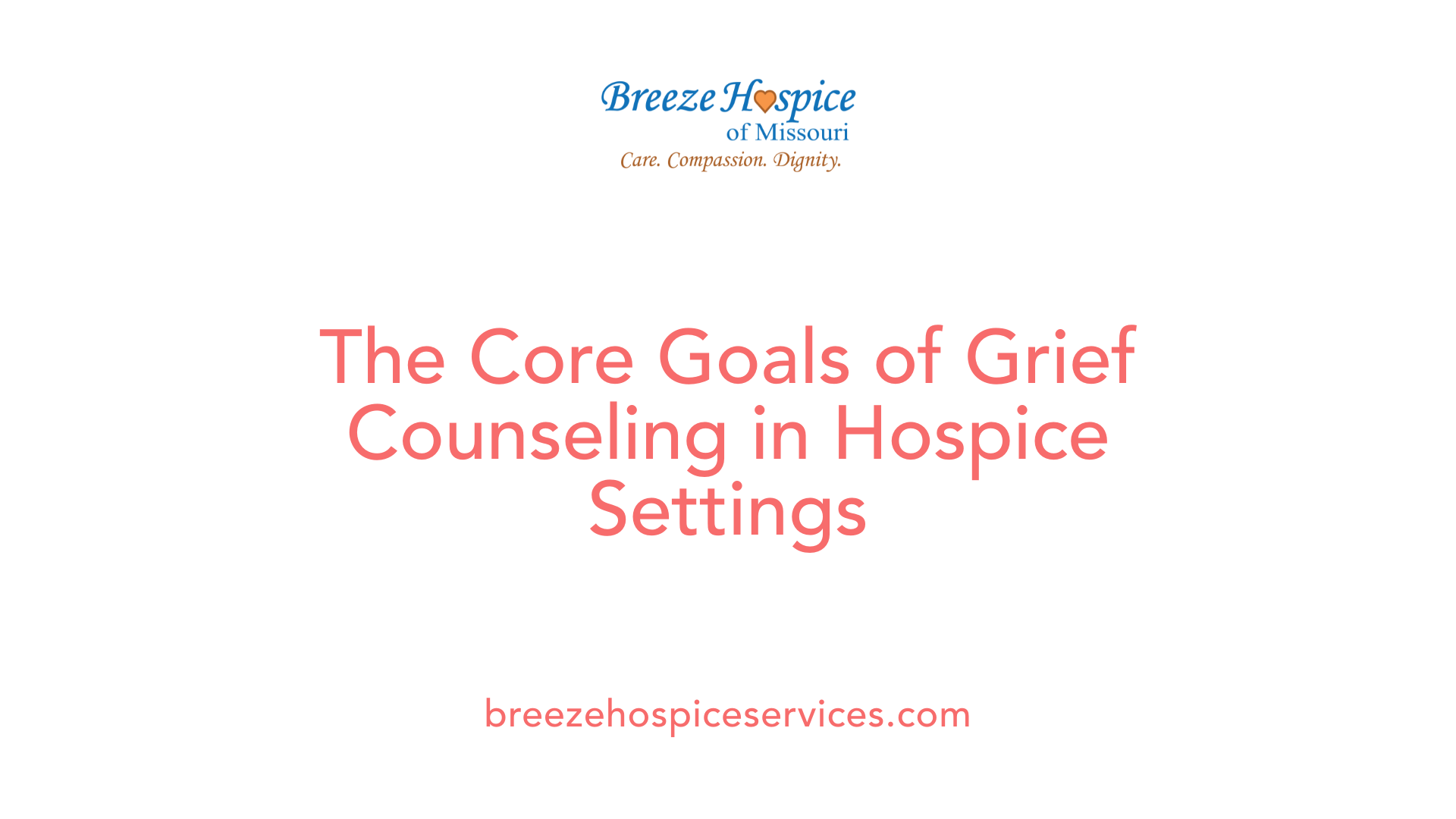
What is the primary purpose of grief counseling?
The main aim of grief counseling in hospice care is to help individuals process the deep and often overwhelming emotions that follow the loss of a loved one. This type of counseling provides a compassionate space where clients can freely express feelings like sadness, anger, guilt, or confusion. It also helps validate their emotional experiences, which is a vital step in healing.
Through targeted support, grief counseling equips individuals with tools to manage their emotional distress. It encourages a gradual adjustment to life after loss and fosters resilience to face future challenges. Counseling sessions often include discussions about the meaning of loss, ways to honor the loved one, and strategies to find new purpose. By doing so, it supports not only emotional recovery but also personal growth, helping people rebuild their lives with hope and understanding.
Ultimately, the goal of grief counseling is to guide individuals through their grief journey, promoting mental and emotional wellbeing over time. It assists clients in transforming their grief from a source of pain into a pathway for healing, acceptance, and renewed strength.
The Multifaceted Role of a Hospice Grief Counselor
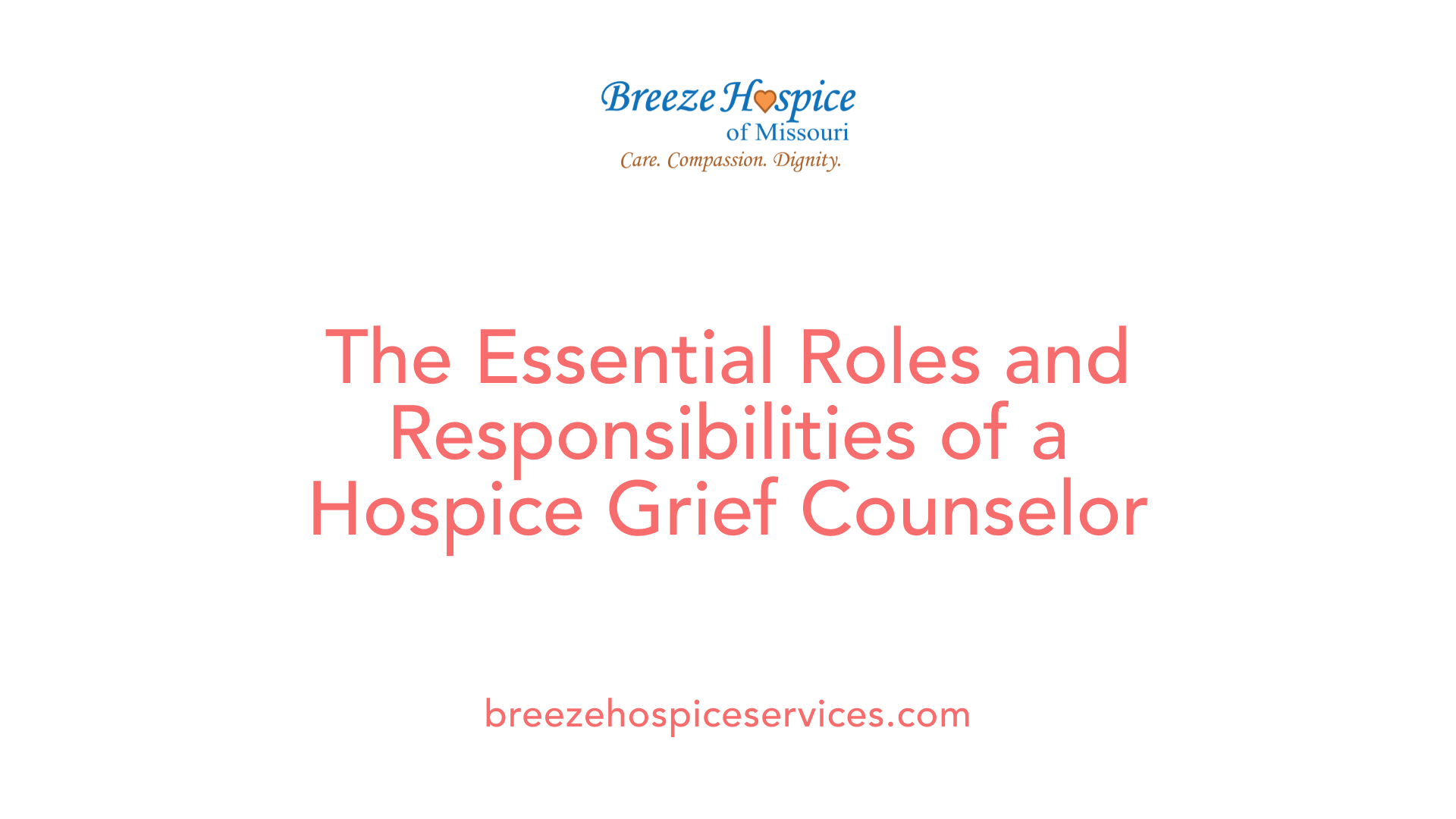
What is the role of a grief counselor?
A grief counselor plays a vital part in helping individuals cope with the emotional, psychological, and spiritual challenges that come with loss and end-of-life situations. Their work is centered on providing personalized support tailored to each person's unique grief process.
Counselors utilize various therapeutic methods, including individual therapy, family sessions, and leading support groups. These approaches help clients process their feelings, confront unresolved issues, and address complex emotions like anger, guilt, or depression.
Fostering open conversations about death, fears, and regrets is also a significant aspect of their role. By creating a safe space, they enable individuals to express thoughts they may find difficult to articulate otherwise.
Spiritual support often forms part of grief counseling. Many counselors incorporate spiritual practices such as prayer, meditation, or reflection, which can bring comfort, peace, and renewed hope to those facing terminal diagnoses or loss.
Ultimately, the role of a hospice grief counselor is to guide people through their darkest moments with compassion and understanding. They aim to help individuals find acceptance, facilitate emotional healing, and support resilience and hope, ensuring that both patients and their families are not alone during these challenging times.
How Hospice Grief Counseling Is Delivered and Its Timing
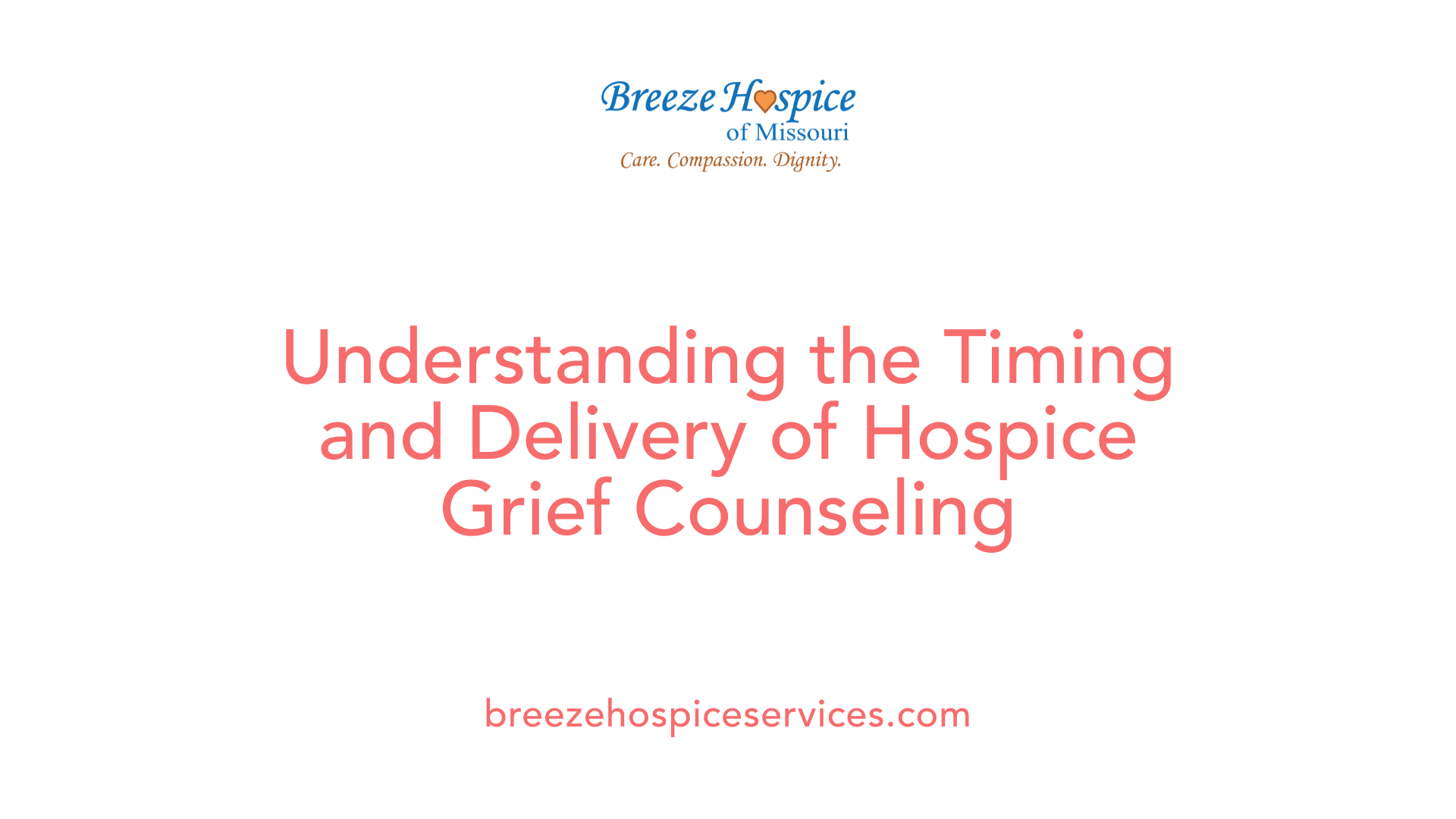
How does hospice grief counseling work?
Hospice grief counseling usually begins within a few weeks after the death of a loved one, typically starting around 38 days post-loss. A trained bereavement counselor is assigned to guide the grieving individual or family through their emotional process.
The first step involves an initial assessment where the counselor explores the relationships, emotional reactions, coping skills, and support systems of the person grieving. This comprehensive evaluation helps tailor the counseling approach to meet specific needs.
Counseling methods are diverse and can include individual sessions for personal reflection, group support meetings for communal sharing, and family counseling to address collective grief and facilitate communication. These sessions provide a safe environment for expressing feelings like sadness, anger, or guilt.
Support doesn't end at the initial sessions. Many hospice programs offer ongoing support through regular follow-up contacts, helping individuals manage prolonged or complicated grief reactions. Counselors may also recommend community resources, support groups, or additional mental health services if necessary.
The overall goal of hospice grief counseling is to facilitate healthy grieving, assist in understanding the stages of loss, and promote emotional resilience. Through education, emotional support, and practical coping strategies, these services aim to help individuals adapt to their new reality and find a path toward healing.
Support Strategies and Therapeutic Interventions in Hospice Bereavement Care
Coping Strategies for Grieving Individuals
In hospice bereavement care, providing structured coping strategies is essential for helping individuals manage their emotional reactions to loss. Techniques such as relaxation exercises, journaling, and mindfulness practices are commonly used.
Relaxation techniques, including guided meditation and deep breathing, help reduce stress and physical symptoms associated with grief. Journaling allows individuals to express their thoughts and feelings privately, fostering emotional release and clarity.
Mindfulness, which involves staying present and accepting one's emotions without judgment, can lessen feelings of anxiety and depression. These methods are practical tools that support emotional regulation during the often tumultuous grief journey.
Therapeutic Approaches Applied in Hospice Settings
Hospice grief counseling employs a range of therapeutic methods tailored to meet individual needs. Psychodynamic therapy helps explore underlying emotional conflicts related to loss, offering insight into complex feelings.
Cognitive-behavioral therapy (CBT) is used to address negative thought patterns, teaching clients how to reframe and challenge maladaptive beliefs about death and grief. Art therapy provides a creative outlet, helping individuals express feelings that are difficult to verbalize.
These approaches are often integrated into counseling sessions to promote healing, acceptance, and personal growth. The choice of therapy depends on the individual’s emotional state, cultural background, and specific grief reactions.
Support for Complex Grief Reactions
Some individuals experience complicated or prolonged grief reactions that do not follow the typical grieving process. These reactions can include persistent yearning, emotional numbness, or difficulty functioning.
Hospice providers recognize the importance of targeted interventions for such cases. Specialized grief therapy, including ongoing counseling, support groups, and educational resources, can aid in addressing these challenges.
Therapists may employ advanced techniques such as cognitive restructuring, role-play, or writing letters to the deceased to help individuals process unresolved feelings.
Continued support and tailored interventions are vital for facilitating eventual acceptance, helping individuals find new meaning, and preventing long-term emotional struggles.
Community and Ongoing Support Beyond Hospice Services
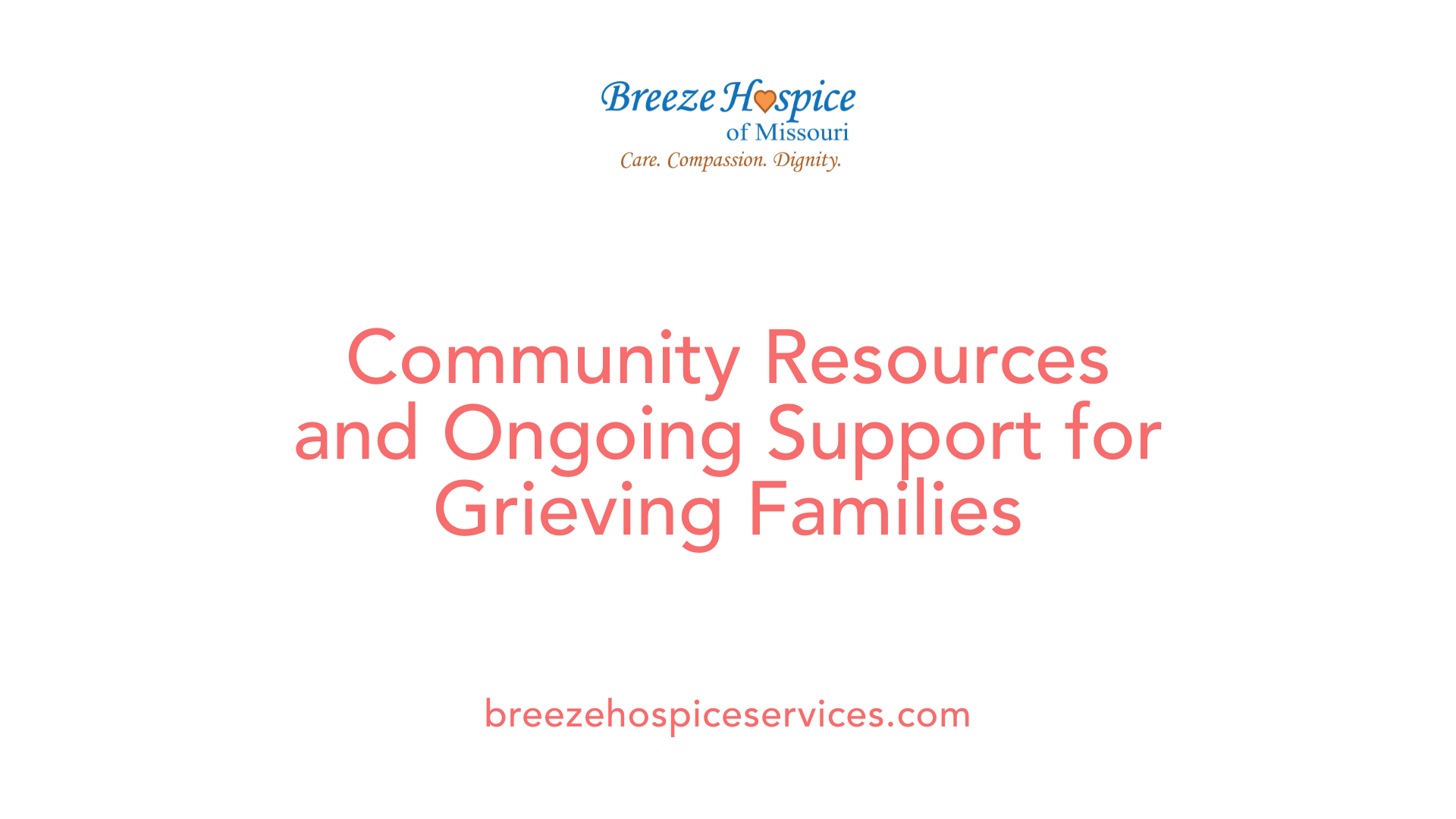
What support groups and community resources are available?
Hospice care providers often facilitate various support groups and connect families with community resources to help them navigate grief. These groups offer a safe space for sharing experiences and gaining comfort from others who understand similar losses. Organizations like Crossroads Hospice & Palliative Care and VNA offer free, professionally facilitated support groups such as "Understanding Grief" and "Living Through Grief.
In addition to support groups, community resources include educational materials, workshops, and memorial events. For children, specialized programs like Camp Healing Powers® help them express emotions and learn coping skills. Resources like magazines, books, and online materials are also provided to support ongoing healing.
How do post-bereavement programs and memorial events help?
Post-bereavement programs are designed to extend support beyond immediate grief, often lasting up to a year or more. Memorial services, remembrance events, and candlelight ceremonies offer opportunities for reflection and honoring loved ones. These activities foster community connection, help mark milestones, and provide closure.
Organizations like Community Hospice and Pathways of Hope organize these events regularly, encouraging families to share memories and receive support.
What long-term emotional support options are available?
Long-term support is crucial for emotional resilience. Trained counselors and social workers continue to offer individual and family counseling well after the initial period of grief. Programs like grief therapy, which address complicated grief reactions, are accessible for those who need ongoing assistance.
Some services include follow-up calls, ongoing therapy sessions, and support groups that meet regularly over months. Community programs also dedicate resources to help individuals reconnect with life and develop healthy coping strategies.
Overall, ongoing community and support services are central to helping individuals recover emotionally and find renewed hope after loss, ensuring that grief support is continuous and responsive to each person's journey.
The Long-Term Impact of Grief Counseling on Healing and Acceptance
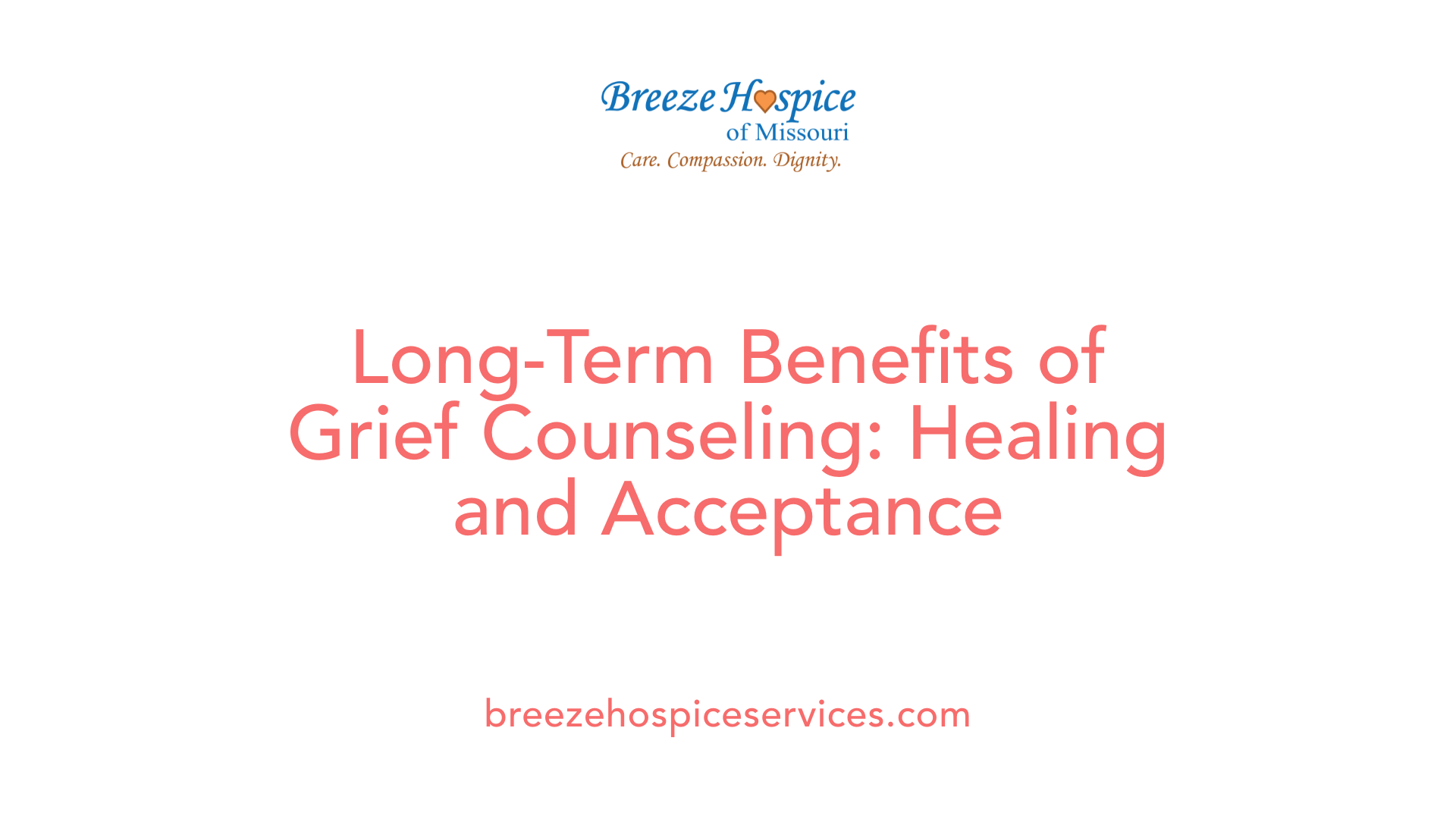
How does grief counseling promote emotional healing and closure?
Grief counseling provides a safe space where individuals can openly express their feelings about the loss. This emotional release is crucial in the healing process. Counselors guide loved ones through their pain, helping them understand and process complex emotions such as sadness, anger, and guilt. Such support fosters personal growth by encouraging acceptance of the reality of death and helps individuals find a sense of closure.
How does support address complicated grief or prolonged grief disorder?
While most people gradually adapt to their loss, some experience prolonged or complicated grief, characterized by intense and persistent symptoms. Hospice grief counselors employ specialized techniques to identify and intervene early. These may include cognitive restructuring, memory work, or therapy approaches tailored to the individual's needs. With ongoing support, many find their symptoms diminish, helping them to regain a sense of normalcy.
What is the role of grief counseling in achieving personal growth after a loved one's death?
Beyond mourning, grief counseling often helps individuals discover new strengths and perspectives. People learn adaptive coping skills, develop resilience, and sometimes find renewed purpose. This process can lead to positive transformations, including increased appreciation for life, strengthened relationships, and greater emotional resilience. Overall, long-term grief support nurtures the journey from pain to acceptance, fostering healing and personal development.
Nurturing Resilience Through Compassionate Care
The services provided by hospice grief counselors are integral to comprehensive end-of-life care, addressing not just the physical but also the emotional and spiritual needs of patients and their families. Through personalized support, therapeutic interventions, and ongoing community resources, these professionals foster resilience, facilitate healing, and help individuals find peace and meaning after loss. Recognizing the profound impact of grief counseling emphasizes the importance of integrating these compassionate services within hospice frameworks, ensuring that no one faces bereavement alone.
References
- Understanding the Role of Bereavement Services in Hospice Care
- The Effects of Counseling about Death and Dying on Perceptions ...
- The Importance of Bereavement Support in Hospice Care
- Grief Support: The Role of Hospice and Palliative Care Providers
- Understanding Bereavement and the Role of Counseling
- Guiding Through Grief: The Hospice Bereavement Coordinator Role
- Palliative Care Grief Counseling: A Supportive Journey
- What is Grief Hospice Counseling and How is it Helpful



































































































